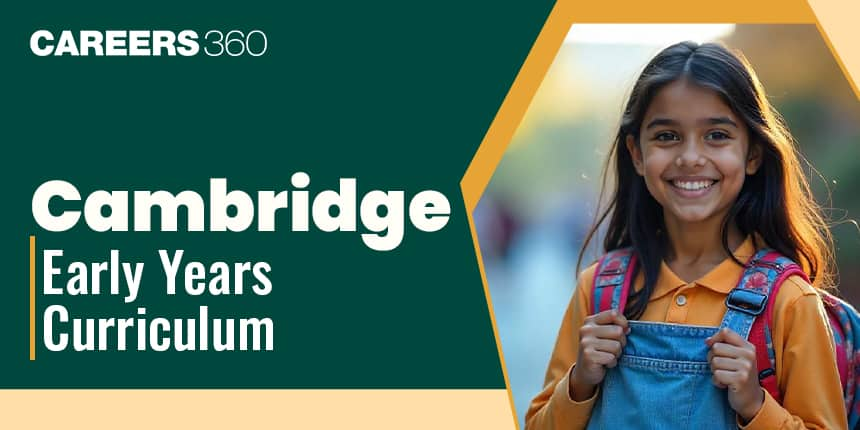Cambridge Early Years Curriculum 2025-26 – Foundation Learning for Young Learners
Developed by the Cambridge Assessment International Education (CAIE), the Cambridge Early Years curriculum is a structured educational program designed for children aged 3 to 6 years. The Cambridge Board Early Years curriculum emphasises an all-round approach to early childhood education, focusing on the cognitive, physical, social, and emotional development of enrolled students. The ultimate goal is to provide a strong foundation for young learners, setting them on the path to lifelong learning.
This Story also Contains
- What is the Cambridge Early Years Curriculum?
- Main Components of the Cambridge Early Years Curriculum
- Benefits of Studying the Cambridge Early Years Curriculum
- Teaching and Assessment Approach in the Cambridge Early Years Curriculum
- Support and Resources for Teachers
- Cambridge Early Years Curriculum Framework
- How to Access the Cambridge Early Years Curriculum?

What is the Cambridge Early Years Curriculum?
The Cambridge Early Years Curriculum is part of a global education system that introduces young children to a learning experience that nurtures curiosity, confidence, and communication skills.
The Cambridge Early Years Curriculum follows international educational practices and standards, along with local relevance.
The Cambridge Board Early Years curriculum focuses on play-based learning, inquiry, and exploration, which are considered essential to develop problem-solving skills at a young age. The curriculum aligns with the Cambridge Pathway, which supports students or learners from early childhood through to secondary education.
Main Components of the Cambridge Early Years Curriculum
The Cambridge Board curriculum for Early Years is organised around several developmental areas to ensure a well-rounded education:
Communication, Language, and Literacy: Focuses on language development, including listening, speaking, reading, and writing.
Physical Development: Encourages activities that enhance motor skills and promote a healthy lifestyle.
Personal, Social, and Emotional Development: Builds skills in self-awareness, social interaction, and emotional regulation.
Mathematics: Introduces basic math, shapes, patterns, and problem-solving.
Understanding the World: Encourages exploration of the environment and communities, and introduces basic concepts in science and technology.
Creative Arts and Design: Supports creative expression through art, music, and role-play.
Benefits of Studying the Cambridge Early Years Curriculum
Choosing the Cambridge Early Years Curriculum offers several advantages. Some of the benefits are mentioned below:
The Cambridge Early Years Curriculum holds a reputation for quality and academic rigour. This global recognition can facilitate a smoother transition to higher levels of the Cambridge education framework.
It is flexible and adaptable. Schools can tailor the curriculum to local needs while maintaining a consistent standard. This flexibility ensures it can be relevant to diverse cultural contexts.
Emphasis on inquiry-based learning helps children develop thinking and problem-solving skills from an early age.
The Cambridge Board's early years curriculum prioritises not just academics but also physical, emotional, and social skills, promoting overall well-being.
Activities are designed to be fun and interactive, which is targeted to develop a love for learning and encourage curiosity. It is quite engaging for the young learners.
Teaching and Assessment Approach in the Cambridge Early Years Curriculum
The Cambridge Early Years Curriculum employs a unique blend of teaching methods. Some of the methods are mentioned below:
There is an emphasis on play-based learning. The curriculum recognises play-based learning as a key vehicle for development, allowing children to learn through exploration and imagination.
The teachers adopt a more inquiry-based approach. They guide and encourage students to ask questions and engage in the problem-solving process actively.
Teachers use observations and ongoing assessments to track progress and adapt teaching strategies, ensuring each child's unique needs are met.
Support and Resources for Teachers
Cambridge Board provides extensive support for schools and teachers, including professional development programs, detailed teaching resources, and assessment tools.
This helps teachers deliver high-quality education and create a nurturing and engaging learning environment.
Cambridge Early Years Curriculum Framework
The curriculum is designed to be age-appropriate and progressive, preparing children for the transition to primary education.
The Cambridge Early Years Framework ensures that children build on their knowledge year by year, developing skills in a structured yet flexible manner.
How to Access the Cambridge Early Years Curriculum?
The Cambridge Early Years Curriculum is an excellent choice for parents who want a well-rounded, internationally recognised education for their child. The Early Years Curriculum is well designed and lays a strong foundation for future learning while respecting the individual needs and cultural contexts of each child.
Parents/students can get detailed information about this curriculum through their official website at cambridgeinternational.org.
Frequently Asked Questions (FAQs)
The detailed information on the Cambridge Board Early Years curriculum can be accessed through the official website at cambridgeinternational.org.
There is an emphasis on play-based learning, teachers encourage children to ask questions and actively participate in problem-solving situations. Teachers observe and assess children regularly to track their progress and meet their different learning needs.
The Cambridge Early Years programme is targeted for children aged 3 to 6 years old.
Applications for Admissions are open.
As per latest syllabus. Physics formulas, equations, & laws of class 11 & 12th chapters
JEE Main Important Chemistry formulas
Get nowAs per latest syllabus. Chemistry formulas, equations, & laws of class 11 & 12th chapters
JEE Main high scoring chapters and topics
Get nowAs per latest 2024 syllabus. Study 40% syllabus and score upto 100% marks in JEE
JEE Main Important Mathematics Formulas
Get nowAs per latest syllabus. Maths formulas, equations, & theorems of class 11 & 12th chapters
